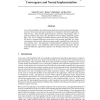288 search results - page 5 / 58 » Learning to Play Chess Using Temporal Differences |
NIPS
2008
13 years 7 months ago
2008
Actor-critic algorithms for reinforcement learning are achieving renewed popularity due to their good convergence properties in situations where other approaches often fail (e.g.,...
ICCBR
2010
Springer
13 years 9 months ago
2010
Springer
In this paper we present an approach for reducing the memory footprint requirement of temporal difference methods in which the set of states is finite. We use case-based generaliza...
AAAI
2010
13 years 7 months ago
2010
A general game player is a system that understands the rules of unknown games and learns to play these games well without human intervention. A major challenge for research in Gen...
ML
1998
ACM
13 years 5 months ago
1998
ACM
Following Tesauro’s work on TD-Gammon, we used a 4000 parameter feed-forward neural network to develop a competitive backgammon evaluation function. Play proceeds by a roll of t...
ML
2002
ACM
13 years 5 months ago
2002
ACM
TD() is a popular family of algorithms for approximate policy evaluation in large MDPs. TD() works by incrementally updating the value function after each observed transition. It h...

